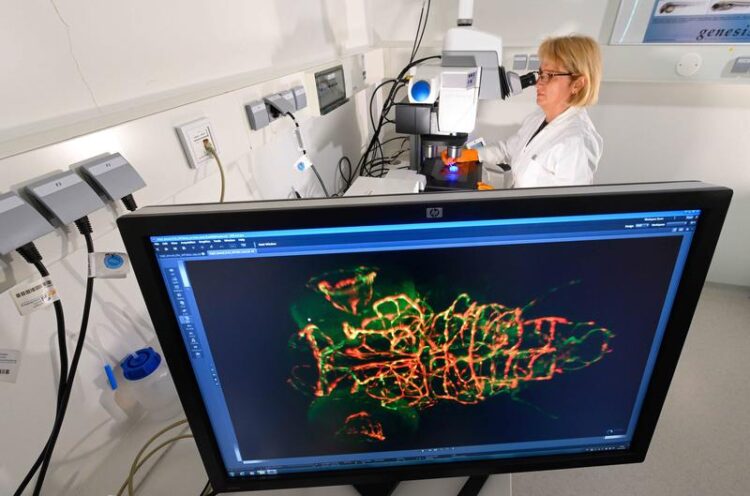What time is it on your biological clock?

Dr Birgit Perner uses a stereo fluorescence microscope to investigate the development of the blood vessels in the head of a fish larva. Using model organisms and imaging techniques play an important role in the IMPULS consortium.
Photo: Jens Meyer/Uni Jena
Interdisciplinary research team of Friedrich Schiller University Jena, the Leibniz Institute on Aging – Fritz Lipmann Institute and Jena University Hospital receives 4.5 million euros in funding from the Carl Zeiss Foundation
As the saying goes: “You’re only as old as you feel”, suggesting that it is not simply the number of years lived that determines a person’s age. Biological age depends on many factors and is also subject to psychological influences. It is perfectly possible for contemporaries to differ in the way they perceive their physical and mental ages: a mind that remains youthful and agile can have a positive effect on physical fitness, while the opposite can also be true.
How biological age is defined, how it can be exactly calculated and which factors influence the complex aging processes in humans – this is what the IMPULS research project of Friedrich Schiller University Jena aims to find out. The project team is being supported over five years by a grant of up to 4.5 million euros from the Carl Zeiss Foundation as part of the “Breakthroughs” programme, the foundation announced today (8 October).
Comprehensive look at the aging process
IMPULS stands for “Identification and manipulation of the physiological and psychological clocks of the lifespan” (Identifizierung und Manipulation der physiologischen und psychologischen Uhren der Lebensspanne). In their project, the researchers therefore want to discover not only how “late” it currently is on a person’s biological clock.
“We also want to know whether and how aging can be slowed down through manipulation of the biological clock,” explains Christoph Englert, coordinator of the joint project. The Professor of Molecular Genetics at the University of Jena and research group leader at the Leibniz Institute on Aging – Fritz Lipmann Institute (FLI) says that aging processes are modulated by individual factors such as nutrition, lifestyle and personal perceptions of age. “By linking physiology and psychology, we wish to develop a new perspective on aging,” he adds.
The project partners specifically want to use studies on humans, but also on various model organisms, to determine new criteria for age determination at the molecular and neurobiological level. In addition, they want to study the effects of physiological factors on aging, for example the influence of sport on brain aging or of nutrition on age-related inflammation.
By measuring brain structure, among other things, the researchers want to find out whether psychological stress or the personal experience of aging has an effect on the biological clock. And last but not least, ethical implications of the possible results form part of the research project: what will it mean if life expectancy and age-related diseases can be predicted more accurately in future? How will society’s view of age change if in future we can also define it biologically and not just chronologically?
In addition to researchers on aging, the project team includes experts in biochemistry, epigenetics, medicine, neuroscience, nutritional science, pharmacy, epidemiology, bioinformatics, biostatistics, psychology and social sciences.
Wissenschaftliche Ansprechpartner:
Prof. Christoph Englert
Leibniz Institute on Aging – Fritz Lipmann Institute (FLI)
Beutenbergstrasse 11, 07745 Jena, Germany
Tel.: +49 (0)3641 656042
E-mail: christoph.englert@leibniz-fli.de
Media Contact
All latest news from the category: Interdisciplinary Research
News and developments from the field of interdisciplinary research.
Among other topics, you can find stimulating reports and articles related to microsystems, emotions research, futures research and stratospheric research.
Newest articles

An Endless Loop: How Some Bacteria Evolve Along With the Seasons
The longest natural metagenome time series ever collected, with microbes, reveals a startling evolutionary pattern on repeat. A Microbial “Groundhog Year” in Lake Mendota Like Bill Murray in the movie…

Witness Groundbreaking Research on Achilles Tendon Recovery
Achilles tendon injuries are common but challenging to monitor during recovery due to the limitations of current imaging techniques. Researchers, led by Associate Professor Zeng Nan from the International Graduate…

Why Prevention Is Better Than Cure—A Novel Approach to Infectious Disease Outbreaks
Researchers have come up with a new way to identify more infectious variants of viruses or bacteria that start spreading in humans – including those causing flu, COVID, whooping cough…



